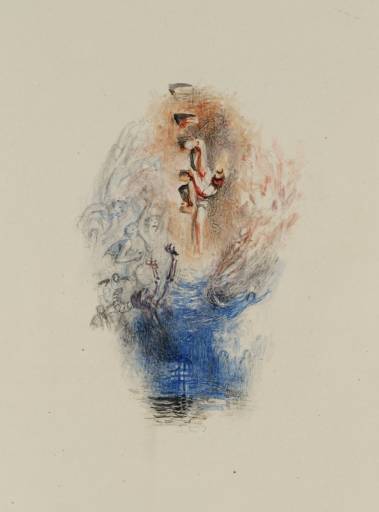Joseph Mallord William Turner Vignette Study for Moore's 'The Epicurean'; Descent into the Well c.1837-8
Joseph Mallord William Turner,
Vignette Study for Moore's 'The Epicurean'; Descent into the Well
c.1837-8
Joseph Mallord William Turner 1775–1851
Vignette Study for Moore’s ‘The Epicurean’; Descent into the Well circa 1837–8
D27646
Turner Bequest CCLXXX 129
Turner Bequest CCLXXX 129
Pencil and watercolour, approximately 110 x 70 mm on three-ply laminated Foolscap Bristol drawing board, 367 x 292 mm
Stamped in black ‘CCLXXX 129’ bottom right
Stamped in black ‘CCLXXX 129’ bottom right
Accepted by the nation as part of the Turner Bequest 1856
Exhibition history
1975
Turner and the Poets: Engravings and Watercolours from his Later Period, Marble Hill House, Twickenham, April–June 1975 (XXX).
References
1905
E.T. Cook, Hidden Treasures of the National Gallery. A Selection of Studies and Drawings by J.M.W. Turner, R.A. Now Published for the First Time. With Some Account of Them. With a Sketch of Turner’s Life, and Reproductions of a Number of his Finished Works, London 1905, p.11, p.72 reproduced.
1909
A.J. Finberg, A Complete Inventory of the Drawings in the Turner Bequest, London 1909, vol.II, p.898, as ‘The descent into the chasm’.
1975
Mordechai Omer, Turner and the Poets: Engravings and Watercolours from his Later Period, exhibition catalogue, Marble Hill House, Twickenham 1975, [pp.49–50].
1993
Jan Piggott, Turner’s Vignettes, exhibition catalogue, Tate Gallery, London 1993, p.96, as ‘Descent into the Well’.
1999
Peter Bower, Turner’s Later Papers: A Study of the Manufacture, Selection and Use of his Drawing Papers 1820–1851, exhibition catalogue, Tate Gallery, London 1999, p.121 note 1.
This sketch belongs to a large group of studies in the Turner Bequest, all of which relate to Turner’s vignettes for John Macrone’s 1839 edition of Thomas Moore’s The Epicurean, a Tale: and Alciphron, a Poem. Unlike most of the works in this group, however, this delicate watercolour appears to be a finished illustration that was not ultimately selected to be engraved or published. The subject shows the hero, Alciphron’s descent into a dangerous well located somewhere beneath the Egyptian pyramids:
Arrived at the end of this gallery, I found my hopes, for the second time, vanish; as the path, it was plain, extended no further. The only object I could discern, by the glimmering of my lamp, which now, every minute, burned fainter and fainter, was the mouth of a huge well that lay gaping before me – a reservoir of darkness, black and unfathomable ... After a more attentive scrutiny, however, I observed, at the depth of a few feet, a sort of iron step, projecting dimly from the side, and, below it, another, which, though hardly perceptible, was just sufficient to encourage an adventurous foot to the trial ... Placing my lamp, therefore (which was hollowed at the bottom, so as to fit like a helmet) firmly upon my head, and having thus both hands at liberty for exertion, I set my foot cautiously on the iron step, and descended into the well. I found the same footing, at regular intervals, to a considerable depth ... when the ladder altogether ceased, and I could descend no further. In vain did I stretch down my foot in search of support – the hard slippery sides were all that it encountered.
(Thomas Moore, The Epicurean, 1839, pp.49–50)
(Thomas Moore, The Epicurean, 1839, pp.49–50)
Turner shows Alciphron with his torch set firmly on his head, climbing gingerly down the side of the well, with one leg reaching down, in vain, for the next iron step. From the dank depths beneath, ghoulish skeletons and goblins swarm and clamour around him.
This is one of two finished studies relating to The Epicurean that have remained in the Turner Bequest, presumably because they were never selected for publication. The other finished subject shows Alciphron’s sleeping (see Tate D27645; Turner Bequest CCLXXX 128). The extent to which these watercolours differ from Turner’s more preliminary and experimental sketches can be gauged by comparing the completed Descent into the Well with a preparatory study for the subject (see Tate D27641; Turner Bequest CCLXXX 124).
Technical notes:
Like many of Turner’s studies for Moore’s The Epicurean, this sketch has been made on three-ply Bristol board, a type of board sold by most artists’ colourmen. The support exhibits three watermarks, ‘Slade | 1836’, and a circular blind embossed stamp, ‘Bristol | [image of crown] | Board’ top left. The board has been laminated with handmade paper which has been trimmed to Foolscap size (nominally 15 x 12 inches). Peter Bower has identified the maker as the William & Thomas Slade Mill, the papermakers who succeeded William Allee at Hurstbourne Priors Mill in Hampshire.1
Like many of Turner’s studies for Moore’s The Epicurean, this sketch has been made on three-ply Bristol board, a type of board sold by most artists’ colourmen. The support exhibits three watermarks, ‘Slade | 1836’, and a circular blind embossed stamp, ‘Bristol | [image of crown] | Board’ top left. The board has been laminated with handmade paper which has been trimmed to Foolscap size (nominally 15 x 12 inches). Peter Bower has identified the maker as the William & Thomas Slade Mill, the papermakers who succeeded William Allee at Hurstbourne Priors Mill in Hampshire.1
Verso:
Inscribed by an unknown hand in pencil ‘129 | b’ centre right
Stamped in black ‘CCLXXX 129’ bottom left
Stamped in black ‘CCLXXX 129’ bottom left
Meredith Gamer
August 2006
How to cite
Meredith Gamer, ‘Vignette Study for Moore’s ‘The Epicurean’; Descent into the Well c.1837–8 by Joseph Mallord William Turner’, catalogue entry, August 2006, in David Blayney Brown (ed.), J.M.W. Turner: Sketchbooks, Drawings and Watercolours, Tate Research Publication, December 2012, https://www

